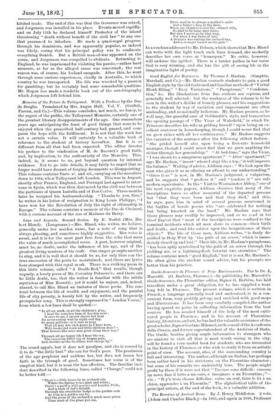Lays and Legends. Second Series. By E. Nesbit (Mrs. Hu-
bert Bland). (Longmans.) —Mrs. Bland, who writes, we believe, generally under her maiden name, has a note of song that is always pleasing, and sometimes highly suggestive. Her voice is sweet, and it is for the most part free from the echo that mars the value of much accomplished verse. A poet, however original, must be, no doubt, under the influence of his age, and of the greatest living masters of his craft. One singer prompts another to sing, and it is well that it should be so, for only thus can the true succession of the poets be maintained; and there are lyrics here stamped with this royal mark. Thera is a striking poem in this little volume, called "A Death-Bed," that recalls, though -vaguely, a lovely poem of Mr. Coventry Patmore's ; and there can be little doubt, too, that the writer is familiar with the subtle mysticism of Miss Rossetti ; yet it would be unjust, and, indeed, absurd, to call Mrs. Bland an imitator of these poets. The con- trast between the life of wealth and enjoyment, and the painful life of city poverty, is keenly felt by the writer, and frequently prompts her song. This is strongly expressed in "London Voices," from which a few lines shall be quoted :— " In all my work, in all the children's play,
I hear the ceaseless hum of Loudon near ; It cries to me, I cannot choose but hear Its never-ending wail by night and day.
So many millions—is it vain to pray That all may win such peace as I have here, With books and work and little children dear ?— That flowers like mine may grow along their way Through all my happy life I hear the cry, The exceeding bitter cry of human pain, And shudder as the deathless wail sweeps by."
The sound appals, but it does not paralyse, and she is roused by it to do "the little best" she can for God's poor. The pessimism of the age perplexes and saddens her, but does not lessen her faith in the triumph of good. Sometimes her verso is of the simplest kind, but it is none the less effective. The familiar inci- dent described in the following lines, called "Change," could not be better told :—
4' There's a little house by an orchard-side
Where the Spring wears pink and white; There's a garden with pansies and London Pride, And a bush of lad's delight.
Through the sweetbriar hedge is the garden seen As trim as a garden can be
And the grass of the orchard is much more green Than most of the grass you see. There used to be always a mother's smile
And a father's face at the door, When one clambered over the 'rchard stile, So glad to be home ones more. But now I never go by that way, For when I was there of late, A stranger was cutting the orchard hay, And a stranger leaned on the gate."
In a roneleau addressed to Mr. Dobson, which shows that Mrs. Bland can write with the light touch such lines demand, she modestly describes her own verse as "homespun." No critic, however, will endorse the epithet. There is a tender pathos in her verse that is very winning, and she has the gift of seeing life in the imaginative light of poetry.






































 Previous page
Previous page